- Home
- Herman Melville
Pierre, Or the Ambiguities Page 2
Pierre, Or the Ambiguities Read online
Page 2
All honor to the names then, and all courtesy to the men; but if St. Albans tell me he is all-honorable and all-eternal, I must still politely refer him to Nell Gwynne.
Beyond Charles n. very few indeed-hardly worthy of note — are the present titled English families which can trace any thing like a direct unvitiated blood-descent from the thief knights of the Norman. Beyond Charles II, their direct genealogies seem vain as though some Jew clothesman, with a tea-canister on his head, turned over the first chapter of St. Matthew to make out his unmingled participation in the blood of King Saul, who had long died ere the career of the Caesar began.
Now, not preliminarily to enlarge upon the fact that, while in England an immense mass of state-masonry is brought to bear as a buttress in upholding the hereditary existence of certain houses, while with us nothing of that kind can possibly be admitted; and to omit all mention of the hundreds of unobtrusive families in New England who, nevertheless, might easily trace their uninterrupted English lineage to a time before Charles the Blade: not to speak of the old and oriental-like English planter families of Virginia and the South; the Randolphs for example, one of whose ancestors, in King James' tune, married Pocahontas the Indian Princess, and in whose blood therefore an underived aboriginal royalty was flowing over two hundred years ago; consider those most ancient and magnificent Dutch manors at the North, whose perches are miles-whose meadows overspread adjacent counties-and whose haughty rent-deeds are held by their thousand farmer-tenants, so long as grass grows and water runs; which hints of a surprising eternity for a deed, and seems to make lawyer's ink unobliterable as the sea. Some of those manors are two centuries old; and their present patroons or lords will show you stakes and stones on their estates put there-the stones at least-before Nell Gwynne the Duke-mother was born, and genealogies which, like their own river, Hudson, flow somewhat farther and straighter than the Serpentine brooklet in Hyde Park.
These far-descended Dutch meadows lie steeped in a Hindooish haze; an eastern patriarchalness sways its mild crook over pastures, whose tenant flocks shall there feed, long as their own grass grows, long as their own water shall run. Such estates seem to defy Time's tooth, and by conditions which take hold of the indestructible earth seem to contemporize their fee-simples with eternity. Unimaginable audacity of a worm that but crawls through the soil he so imperially claims! In midland counties of England they boast of old oaken dinning-halls where three hundred men-at-arms could exercise of a rainy afternoon, in the reign of the Plantagenets. But our lords, the patroons, appeal not to the past, but they point to the present. One will show you that the public census of a county, is but part of the roll of his tenants. Ranges of mountains, high as Ben Nevis or Snowdon, are their walls; and regular armies, with staffs of officers, crossing rivers with artillery, and marching through primeval woods, and threading vast rocky defiles, have been sent out to distrain upon three thousand farmer-tenants of one landlord, at a blow. A fact most suggestive two ways; both whereof shall be nameless here.
But whatever one may think of the existence of such mighty lordships in the heart of a republic, and however we may wonder at their thus surviving, like Indian mounds, the Revolutionary flood; yet survive and exist they do, and are now owned by their present proprietors, by as good nominal title as any peasant owns his father's old hat, or any duke his great-uncle's old coronet.
For all this, then, we shall not err very widely if we humbly conceive, that-should she choose to glorify herself in that inconsiderable way-our America will make out a good general case with England in this short little matter of large estates, and long pedigrees-pedigrees I mean, wherein is no flaw.
IV
In general terms we have been thus decided in asserting the great genealogical and real-estate dignity of some families in America, because in so doing we poetically establish the richly aristocratic condition of Master Pierre Glendinning, for whom we have before claimed some special family distinction. And to the observant reader the sequel will not fail to show, how important is this circumstance, considered with reference to the singularly developed character and most singular life-career of our hero. Nor will any man dream that the last chapter was merely intended for a foolish bravado, and not with a solid purpose in view.
Now Pierre stands on this noble pedestal; we shall see if he keeps that fine footing; we shall see if Fate hath not just a little bit of a small word or two to say in this world. But it is not laid down here that the Glendinnings dated back beyond Pharaoh, or the deeds of Saddle Meadows to the Three Magi in the Gospels. Nevertheless, those deeds, as before hinted, did indeed date back to three kings-Indian kings-only so much the finer for that.
But if Pierre did not date back to the Pharaohs, and if the English farmer Hampdens were somewhat the seniors of even the oldest Glendinning; and if some American manors boasted a few additional years and square miles over his, yet think you that it is at all possible, that a youth of nineteen should- merely by way of trial of the thing-strew his ancestral kitchen hearthstone with wheat in the stalk, and there standing in the chimney thresh out that grain with a flail, whose aerial evolutions had free play among all that masonry; were it not impossible for such a flailer so to thresh wheat in his own ancestral kitchen chimney without feeling just a little twinge or two of what one might call family pride? I should say not.
Or how think you it would be with this youthful Pierre, if every day descending to breakfast, he caught sight of an old? tattered British banner or two, hanging over an arched window in his hall; and those banners captured by his grandfather, the general, in fair fight? Or how think you it would be if every time he heard the band of the military company of the village, he should distinctly recognize the peculiar tap of a British kettle-drum also captured by his grandfather in fair fight, and afterwards suitably inscribed on the brass and bestowed upon the Saddle Meadows Artillery Corps? Or how think you it would be, if sometimes of a mild meditative Fourth of July morning in the country, he carried out with him into the garden by way of ceremonial cane, a long, majestic, silver-tipped staff, a Major-General's baton, once wielded on the plume-nodding and musket-flashing review by the same grandfather several times herein-before mentioned? I should say that considering Pierre was quite young and very unphilosophical as yet, and withal rather high-blooded; and sometimes read the History of the Revolutionary War, and possessed a mother who very frequently made remote social allusions to the epaulettes of the Major-General his grandfather;-I should say that upon all of these occasions, the way it must have been with him, was a very proud, elated sort of way. And if this seem but too fond and foolish in Pierre; and if you tell me that this sort of thing in him showed him no sterling Democrat, and that a truly noble man should never brag of any arm but his own; then I beg you to consider again that this Pierre was but a youngster as yet. And believe me you will pronounce Pierre a thorough-going Democrat in time; perhaps a little too Radical altogether to your fancy.
In conclusion, do not blame me if I here make repetition, and do verbally quote my own words in saying that it had been the choice fate of Pierre to have been born and bred in the country. For to a noble American youth this indeed-more than in any other land-this indeed is a most rare and choice lot. For it is to be observed, that while in other countries, the finest families boast of the country as their home; the more prominent among us, proudly cite the city as their seat. Too often the American that himself makes his fortune, builds him a great metropolitan house, in the most metropolitan street of the most metropolitan town. Whereas a European of the same sort would thereupon migrate into the country. That herein the European hath the better of it, no poet, no philosopher, and no aristocrat will deny. For the country is not only the most poetical and philosophical, but it is the most aristocratic part of this earth, for it is the most venerable, and numerous bards have ennobled it by many fine titles. Whereas the town is the more plebeian portion: which, besides many other things, is plainly evinced by the dirty unwashed face perpetually worn
by the town; but the country, like any Queen, is ever attended by scrupulous lady's maids in the guise of the seasons, and the town hath but one dress of brick turned up with stone; but the country hath a brave dress for every week in the year; sometimes she changes her dress twenty-four times in the twenty-four hours; and the country weareth her sun by day as a diamond on a Queen's brow; and the stars by night as necklaces of gold beads; whereas the town's sun is smoky paste, and no diamond, and the town's stars are pinchbeck and not gold.
In the country then Nature planted our Pierre; because Nature intended a rare and original development in Pierre. Never mind if hereby she proved ambiguous to him in the end; nevertheless, in the beginning she did bravely. She blew her wind-clarion from the blue hills, and Pierre neighed out lyrical thoughts, as at the trumpet-blast, a war-horse paws himself into a lyric of foam. She whispered through her deep groves at eve, and gentle whispers of humanness, and sweet whispers of love, ran through Pierre's thought-veins, musical as water over pebbles. She lifted her spangled crest of a thickly-starred night, and forth at that glimpse of their divine Captain and Lord, ten thousand mailed thoughts of heroicness started up in Pierre's soul, and glared round for some insulted good cause to defend.
So the country was a glorious benediction to young Pierre; we shall see if that blessing pass from him as did the divine blessing from the Hebrews; we shall yet see again, I say, whether Fate hath not just a little bit of a word or two to say in this world; we shall see whether this wee little bit scrap of latinity be very far out of the way- Nemo contra Deum nisi Deus ipse.
V
"Sister Mary," said Pierre, returned from his sunrise stroll, and tapping at his mother's chamber door:-"do you know, sister Mary, that the trees which have been up all night, are all abroad again this morning before you? — Do you not smell something like coffee, my sister?"
A light step moved from within toward the door; which opened, showing Mrs. Glendinning, in a resplendently cheerful morning robe, and holding a gay wide ribbon in her hand.
"Good morning, Madam," said Pierre, slowly, and with a bow, whose genuine and spontaneous reverence amusingly contrasted with the sportive manner that had preceded it. For thus sweetly and religiously was the familiarity of his affections bottomed on the profoundest filial respect.
"Good afternoon to you, Pierre, for I suppose it is afternoon. But come, you shall finish my toilet;-here, brother"- reaching the ribbon-"now acquit yourself bravely"-and seating herself away from the glass, she awaited the good offices of Pierre.
"First Lady in waiting to the Dowager Duchess Glendinning," laughed Pierre, as bowing over before his mother, he gracefully passed the ribbon round her neck, simply crossing the ends in front.
"Well, what is to hold it there, Pierre?"
"I am going to try and tack it with a kiss, sister, — there! — oh, what a pity that sort of fastening won't always hold! — where's the cameo with the fawns, I gave you last night? — Ah! on the slab-you were going to wear it then? — Thank you, my considerate and most politic sister-there! — but stop-here's a ringlet gone romping-so now, dear sister, give that Assyrian toss to your head."
The haughtily happy mother rose to her feet, and as she stood before the mirror to criticize her son's adornings, Pierre, noticing the straggling tie of her slipper, knelt down and secured it. "And now for the urn," he cried, "Madam!" and with a humorous gallantry, offering his arm to his mother, the pair descended to breakfast.
With Mrs. Glendinning it was one of those spontaneous maxims, which women sometimes act upon without ever thinking of, never to appear in the presence of her son in any dishabille that was not eminently becoming. Her own independent observation of things, had revealed to her many very common maxims, which often become operatively lifeless from a vicarious reception of them. She was vividly aware how immense was that influence, which, even in the closest ties of the heart, the merest appearances make upon the mind. And as in the admiring love and graceful devotion of Pierre lay now her highest joy in life; so she omitted no slightest trifle which could possibly contribute to the preservation of so sweet and flattering a thing.
Besides all this, Mary Glendinning was a woman, and with more than the ordinary vanity of women-if vanity it can be called-which in a life of nearly fifty years had never betrayed her into a single published impropriety, or caused her one known pang at the heart. Moreover, she had never yearned for admiration; because that was her birthright by the eternal privilege of beauty; she had always possessed it; she had not to turn her head for it, since spontaneously it always encompassed her. Vanity, which in so many women approaches to a spiritual vice, and therefore to a visible blemish; in her peculiar case-and though possessed in a transcendent degree — was still the token of the highest health; inasmuch as never knowing what it was to yearn for its gratification, she was almost entirely unconscious of possessing it at all. Many women carry this light of their lives flaming on their foreheads; but Mary Glendinning unknowingly bore hers within. Through all the infinite traceries of feminine art, she evenly glowed like a vase which, internally illuminated, gives no outward sign of the lighting flame, but seems to shine by the very virtue of the exquisite marble itself. But that bluff corporeal admiration, with which some ball-room women are content, was no admiration to the mother of Pierre. Not the general homage of men, but the selected homage of the noblest men, was what she felt to be her appropriate right. And as her own maternal partialities were added to, and glorified the rare and absolute merits of Pierre; she considered the voluntary allegiance of his affectionate soul, the representative fealty of the choicest guild of his race. Thus, though replenished through all her veins with the subtlest vanity, with the homage of Pierre alone she was content.
But as to a woman of sense and spirit, the admiration of even the noblest and most gifted man, is esteemed as nothing, so long as she remains conscious of possessing no directly influencing and practical sorcery over his soul; and as notwithstanding all his intellectual superiority to his mother, Pierre, through the unavoidable weakness of inexperienced and unexpanded youth, was strangely docile to the maternal tuitions in nearly all the things which thus far had any way interested or affected him; therefore it was, that to Mary Glendinning this reverence of Pierre was invested with all the proudest delights and witcheries of self-complacency, which it is possible for the most conquering virgin to feel. Still more. That nameless and infinitely delicate aroma of inexpressible tenderness and attentiveness which, in every refined and honorable attachment, is cotemporary with the courtship, and precedes the final banns and the rite; but which, like the bouquet of the costliest German wines, too often evaporates upon pouring love out to drink, in the disenchanting glasses of the matrimonial days and nights; this highest and airiest thing in the whole compass of the experience of our mortal life; this heavenly evanescence-still further etherealized in the filial breast-was for Mary Glendinning, now not very far from her grand climacteric, miraculously revived in the courteous lover-like adoration of Pierre.
Altogether having its origin in a wonderful but purely fortuitous combination of the happiest and rarest accidents of earth; and not to be limited in duration by that climax which is so fatal to ordinary love; this softened spell which still wheeled the mother and son in one orbit of joy, seemed a glimpse of the glorious possibility, that the divinest of those emotions, which are incident to the sweetest season of love, is capable of an indefinite translation into many of the less signal relations of our many chequered life. In a detached and individual way, it seemed almost to realize here below the sweet dreams of those religious enthusiasts, who paint to us a Paradise to come, when etheralized from all drosses and stains, the holiest passion of man shall unite all kindreds and climes in one circle of pure and unimpairable delight.
VI
There was one little uncelestial trait, which, in the opinion of some, may mar the romantic merits of the gentlemanly Pierre Glendinning. He always had an excellent appetite, and especially for hi
s breakfast. But when we consider that though Pierre's hands were small, and his ruffles white, yet his arm was by no means dainty, and his complexion inclined to brown; and that he generally rose with the sun, and could not sleep without riding his twenty, or walking his twelve miles a day, or felling a fair-sized hemlock in the forest, or boxing, or fencing, or boating, or performing some other gymnastical feat; when we consider these athletic habitudes of Pierre, and the great fullness of brawn and muscle they built round about him; all of which manly brawn and muscle, three times a day loudly clamored for attention; we shall very soon perceive that to have a bountiful appetite, was not only no vulgar reproach, but a right royal grace and honor to Pierre; attesting him a man and a gentleman; for a thoroughly developed gentleman is always robust and healthy; and Robustness and Health are great trenchermen.
So when Pierre and his mother descended to breakfast, and Pierre had scrupulously seen her supplied with whatever little things were convenient to her; and had twice or thrice ordered the respectable and immemorial Dates, the servitor, to adjust and re-adjust the window-sashes, so that no unkind current of air should take undue liberties with his mother's neck; after seeing to all this, but in a very quiet and inconspicuous way; and also after directing the unruffled Dates, to swing out, horizontally into a particular light, a fine joyous painting, in the good-fellow, Flemish style (which painting was so attached to the wall as to be capable of that mode of adjusting), and furthermore after darting from where he sat a few invigorating glances over the river-meadows to the blue mountains beyond; Pierre made a masonic sort of mysterious motion to the excellent Dates, who in automaton obedience thereto, brought from a certain agreeable little side-stand, a very prominent-looking cold pasty; which, on careful inspection with the knife, proved to be the embossed savory nest of a few uncommonly tender pigeons of Pierre's own shooting.

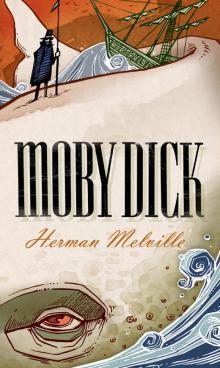 Moby Dick; Or, The Whale
Moby Dick; Or, The Whale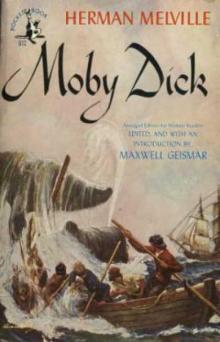 Moby Dick
Moby Dick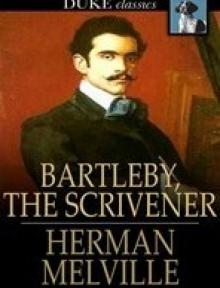 Benito Cereno and Bartleby the Scrivener
Benito Cereno and Bartleby the Scrivener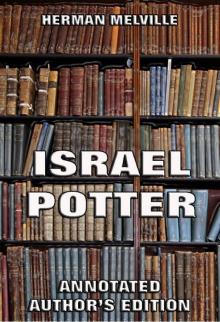 Israel Potter: His Fifty Years of Exile (Annotated Edition)
Israel Potter: His Fifty Years of Exile (Annotated Edition)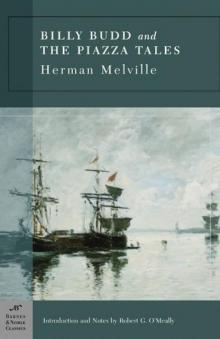 Billy Budd and the Piazza Tales
Billy Budd and the Piazza Tales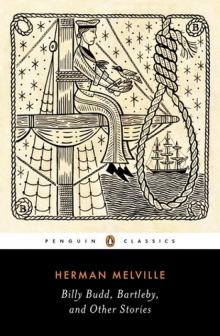 Billy Budd, Bartleby, and Other Stories
Billy Budd, Bartleby, and Other Stories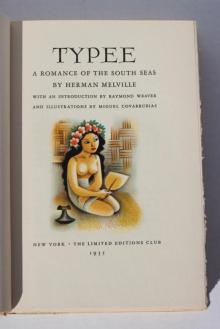 Typee: A Romance of the South Seas
Typee: A Romance of the South Seas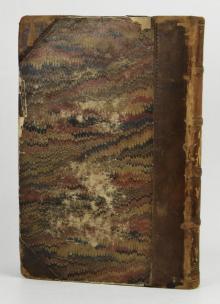 Omoo: Adventures in the South Seas
Omoo: Adventures in the South Seas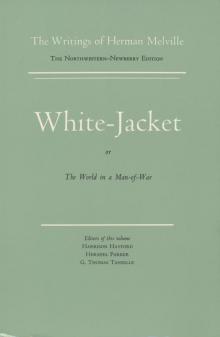 White Jacket; Or, The World on a Man-of-War
White Jacket; Or, The World on a Man-of-War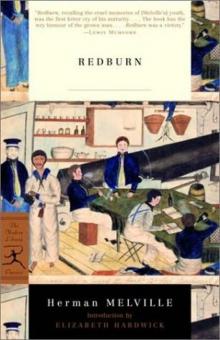 Redburn. His First Voyage
Redburn. His First Voyage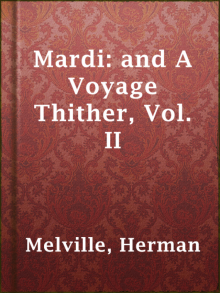 Mardi: and A Voyage Thither, Vol. II
Mardi: and A Voyage Thither, Vol. II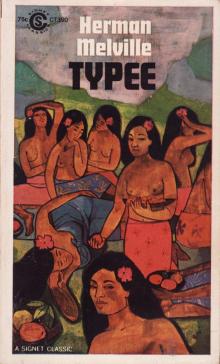 Typee
Typee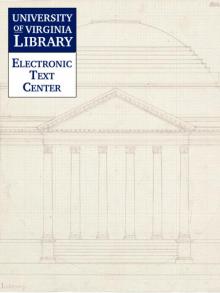 The Paradise of Bachelors and the Tartarus of Maids
The Paradise of Bachelors and the Tartarus of Maids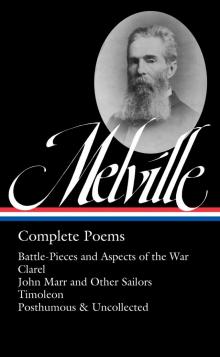 Herman Melville- Complete Poems
Herman Melville- Complete Poems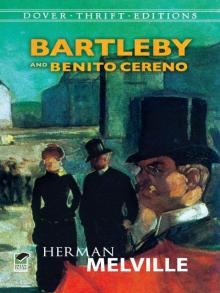 Bartleby and Benito Cereno
Bartleby and Benito Cereno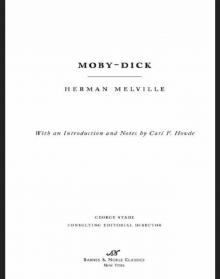 Moby-Dick (Barnes & Noble Classics Series)
Moby-Dick (Barnes & Noble Classics Series)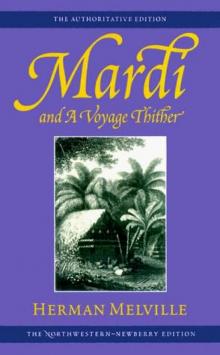 Mardi and a Voyage Thither
Mardi and a Voyage Thither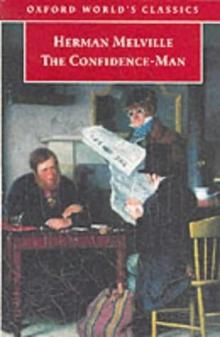 The Confidence-Man
The Confidence-Man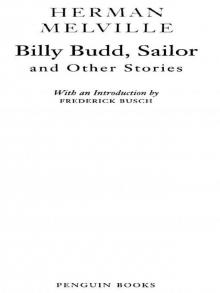 Billy Budd and Other Stories
Billy Budd and Other Stories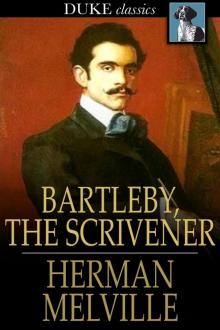 Bartleby the Scrivener
Bartleby the Scrivener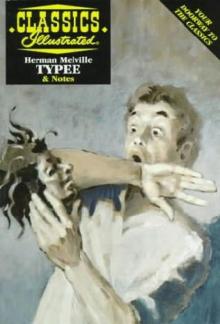 Typee: A Romance of the South Sea
Typee: A Romance of the South Sea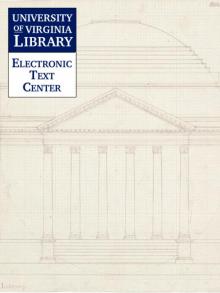 I and My Chimney
I and My Chimney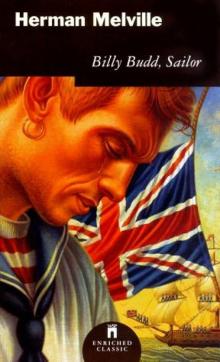 Billy Budd
Billy Budd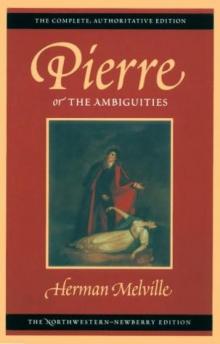 Pierre, Or the Ambiguities
Pierre, Or the Ambiguities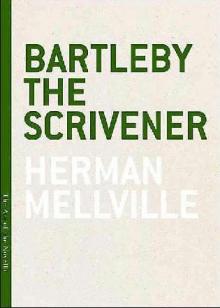 Bartleby, The Scrivener A Story of Wall-Street
Bartleby, The Scrivener A Story of Wall-Street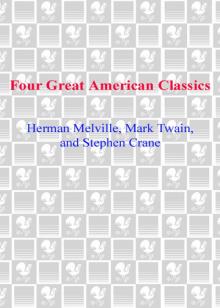 Four Great American Classics
Four Great American Classics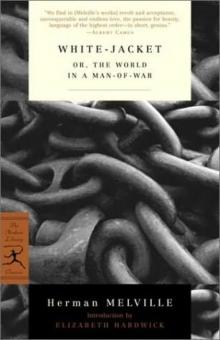 White Jacket or, The World on a Man-of-War
White Jacket or, The World on a Man-of-War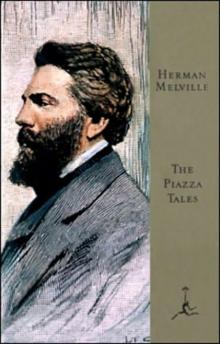 The Piazza Tales
The Piazza Tales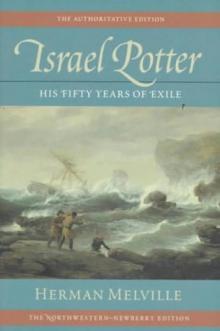 Israel Potter. Fifty Years of Exile
Israel Potter. Fifty Years of Exile